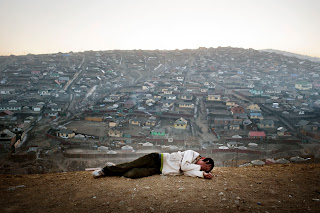Sixty percent of the 1 million residence of Ulanbataar live in peri-urban developments north and upwind of the city center. They live in small shacks and round ger huts, the traditional nomadic Mongolian home. Because they are not on the cities' heating grid, these people resort to burning low quality coal, wood, and in often trash as a means to stay warm during the harsh Siberian winters.
A view of a Ger district outside and upwind of Ulanbataar. I think that man is sleeping.
I have heard stories from people since I have arrived. They truly believe that this pollution is killing them. I've heard that its not uncommon to see people driving some mornings with their headlights on just to see through the pollution haze. Others say that they refuse to step outside without a heavy-duty air filter mask. Ulanbataar is well on its way of becoming the most polluted city in the world, if its not already there.
The pollution poses great health risks as it contains carbon monoxide, mercury and lead. Each year people claim it gets worse as an increasing number of people move from the rural parts of Mongolia to the capital, increasing to the density of the ger districts and driving up the number of cars on the road. Another factor which contributes to the poor air quality is dust, much of which is kicked up on the poorly paved roads. According to Reuters, over 80% of children under the age of 5 suffer from some sort of respiratory disorder.
In Ulanbataar the average particulate matter concentrations (PM10, i.e, particles that cause damage to the lungs when inhaled) have been recorded as high as 279. To put this in perspective, the World Health Organization's recommendation PM10 level is 20. That means that Ulanbataar's PM10 levels are 14 times higher than the levels recommended by the WHO. This is repulsive.
a typical winter day in Ulanbataar..
This problem needs to be solved, and fast. I have heard that the government has a lot of money for anyone who can come up with a creative way to solve the nation's pollution crisis. Many want the government to invest in new and more efficient heating stoves for the local ger districts and provide the people with higher quality coal (which the country has plenty of). Others are saying the government should subsidies some sort of natural gas initiative. Whatever they do, it must address the problem at it's root and not be some sort of pollution control technology as this would only prove to be a waste of the peoples time and money.
One step in the right direction is known as the Japan Fund for Poverty Reduction (JFPR) project, where the United Nations Development Program has engineered a blanked which the people living in the poor neighborhoods will use to cover their ger tents. The aim here is to better insulate them in the colder months, and to reduce emissions, heating consumption, and thus their energy bill. Within the project also exists funding to create local businesses which will produce and supply these insulating blankets.
a typical Mongolian ger and the insulating blanket.
It's funny, as I'm writing this the skies are bright blue and the air is fresher than ever. I have been here for 10 days and I cannot fathom what this place thickened with death smog must be like. Let me tell you the pollution is really the only thing that really terrifies me about considering to stay here if I were to find an interesting job. All I can say now is that I hope the government is wise and forward thinking enough to create a solution which will provide jobs for the local people while educating them about environmental sustainability and the harmful properties of carbon emissions.




No comments:
Post a Comment